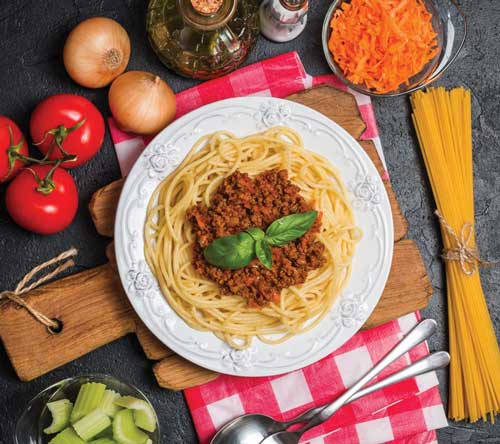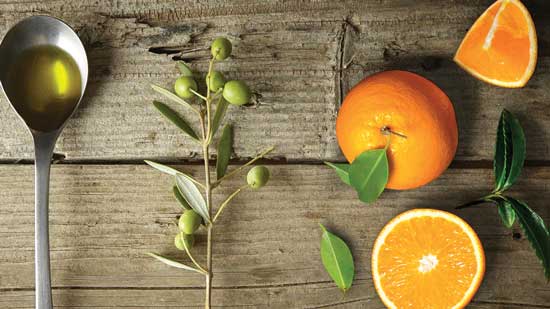The Ups and Downs of Blood Pressure
NUTRACEUTICALS
It is often referred to as a “silent killer” because there are no outright obvious symptoms. But high blood pressure can have serious effects, damaging the arteries, heart, and other organs. In fact, hypertension, a form of high blood pressure, is the most common risk factor for cardiovascular disease in the United States, affecting one in three adults.
It is estimated that 43 million Americans suffer with high blood pressure, and less than 10 million are successfully managing it. Many lifestyle factors such as stress, obesity, smoking, and high sodium intake contribute to increased blood pressure. Speaking from personal experience, even genetics can predispose people to high blood pressure.
While it is a known fact that reducing sodium consumption can help lower high blood pressure, other ingredients have been shown to aid in regulating or lowering blood pressure. Here is a look at some of these.
 Omega-3 Fatty Acids
Omega-3 Fatty Acids
Omega-3 fatty acids have been shown to help lower blood pressure. It is thought that their effect on blood pressure is by helping to reduce inflammation, which can damage blood vessels. The American Heart Assoc. recommends consuming fish high in omega-3 fatty acids, such as salmon, mackerel, herring, sardines, lake trout, and tuna, at least twice a week.
Preliminary research presented at this year’s American Heart Assoc. Scientific Sessions showed that diets rich in omega-3 fatty acids may help lower blood pressure in young, healthy adults (Filipovic 2016). The researchers studied 2,036 young, healthy adults by measuring the amount of omega-3 fatty acids in their blood and recording their blood pressure measurements. They divided the subjects into four groups, from the quarter with the highest amount of omega-3 fatty acids in their blood to the quarter with the lowest. They found that the adults with the highest amount of omega-3s in their blood had about 4 mm Hg lower systolic and 2 mm Hg lower diastolic blood pressure compared to those with the least amount of omega-3s in their blood.
In a meta-analysis of randomized controlled trials, Miller et al. (2014) indicated that eicosapentaenoic acid and docosahexaenoic acid (EPA+DHA) reduced systolic and diastolic blood pressure. Seventy randomized controlled trials were reviewed. The strongest effects of EPA+DHA were observed among untreated hypertensive subjects, although blood pressure also was lowered among normotensive subjects.
Grape Seed Extract
A patented grape seed extract has been clinically shown to help maintain healthy blood pressure levels within the normal range. MegaNatural BP from Polyphenolics, a division of Constellation Brands, Madera, Calif. (polyphenolics.com), is an antioxidant that helps support endothelial function by maintaining healthy nitric oxide levels that are within the normal range. This helps support healthy vasodilation and blood flow. Research using animal models indicates that the grape seed extract activates the enzyme nitric oxide synthase to produce nitric oxide, which acts as a cellular messenger. When it is present in the inner lining of the blood vessels, known as the endothelium, it causes the surrounding smooth muscle to relax. This endothelium-dependent relaxation of the blood vessels then supports healthy blood flow.
Robinson et al. (2012) showed that an 8-week treatment with 300 mg of MegaNatural BP/day lowered systolic and diastolic blood pressure in a study of 30 people with prehypertension. Prehypertension is a systolic blood pressure of 120–139 mm Hg or a diastolic blood pressure of 80–89 mm Hg. Most recently, Park et al. (2016) demonstrated that MegaNatural BP was safe and improved blood pressure in people with prehypertension. For the study, 29 middle-aged adults with prehypertension consumed a fruit-flavored beverage placebo or 150 mg of MegaNatural BP twice per day (300 mg/day) in a fruit-flavored beverage for 6 weeks, preceded by a 2-week placebo run-in and 4-week no-beverage follow-up. After 6 weeks, MegaNatural BP was found to help maintain blood pressure levels within the normal range. After the 4-week no-beverage follow-up period, blood pressure increased to original levels.
Ingredients for Arterial Health and Blood Flow
Arterial health affects blood pressure as arterial inflexibility can lead to increased blood pressure. A growing number of ingredients have been shown to benefit arterial health as well as blood flow.
• Vitamin K2. Vitamin K2 has been shown to inhibit calcium deposits in the arteries, which can impede blood flow. PLT Health, Morristown, N.J. (plthealth.com), offers MenaQ7, a natural source of vitamin K2 in the form of menaquinone-7 (MK-7). It is a fermentation extract of Bacillus licheniformis.
Vissers et al. (2016) showed that high vitamin K2 intake was associated with a lower risk of peripheral arterial disease (PAD). This association was stronger in hypertensive participants. The researchers used a prospective cohort with 36,629 subjects. During 12.1 years of follow-up, 489 incident cases of PAD were documented. The intake of menaquinone was associated with a reduced risk of PAD for the highest versus lowest quartile. A stronger association was observed in subjects with hypertension or diabetes.
• Cocoa flavanols. Cocoa flavanols are polyphenols that have been shown to benefit the elasticity of blood vessels, which contributes to normal blood circulation. Barry Callebaut, Zurich, Switzerland (barry-callebaut.com, acticoa.com), offers Acticoa cocoa powder, which contains a minimum of 7.5% cocoa flavanols and an average of 8.3%. Barry Callebaut received approval from the European Commission to make the following health claim, “Cocoa flavanols help maintain the elasticity of blood vessels, which contributes to normal blood flow.” Acticoa cocoa powder and Acticoa chocolate are the result of seven years of intense research and development. Through controlled sourcing and processing, Barry Callebaut has found a way to retain the naturally occurring flavanols in cocoa beans.
Mars Symbioscience, Germantown, Md. (cocoavia.com), also offers cocoa flavanols in CocoaVia, a brand of daily cocoa extract supplement that delivers 375 mg of cocoa flavanols/serving. Numerous scientific studies have demonstrated that the cocoa flavanols in CocoaVia products promote healthy blood flow. The cocoa flavanols work by helping support the body’s pool of nitric oxide. One of the many things that nitric oxide does is trigger the relaxation of the vessels in response to changes in blood flow. Cocoa flavanols help maintain healthy levels of nitric oxide, which in turn helps maintain the healthy flow of oxygen and nutrients.
--- PAGE BREAK ---
• Tomato extract. A water-soluble, tomato-based concentrate is offered in two variant forms: Fruitflow I (water-soluble syrup) and its sugar-free derivative Fruitflow II (powder). Both ingredients are offered by DSM Nutritional Products, Parsippany, N.J. (dsm.com). They are prepared from tomato extract using patented processes and are standardized on 3 bioactive fractions.
Fruitflow has been shown to contribute to healthy blood flow. In 10 human trials, the consumption of Fruitflow has been shown to maintain healthy platelet aggregation and improve blood flow. The studies showed healthy platelet aggregation was maintained. Platelets became less activated or “smoother” after the subject consumed a food, beverage, or dietary supplement containing Fruitflow.
• French maritime pine bark extract. Pycnogenol, from Horphag Research, Geneva, Switzerland (pycnogenol.com), is a natural plant extract derived from the bark of the maritime pine that grows along the coast of southwest France. It contains a unique combination of procyanidins, bioflavonoids, and phenolic acids, which offer extensive natural health benefits. Pycnogenol may help to normalize blood pressure and platelet function. Research has found that it helps maintain healthy circulation by increasing vasodialation of blood vessels, thus improving blood flow.
 • Olive and citrus extract. At this year’s SupplySide West show, Israeli company Frutarom Health BU (frutaromhealth.com), introduced CitrOlive, a patented natural ingredient formulation of olive and citrus extracts. The benefits of CitrOlive result from its strong antioxidant and anti-inflammatory activity. It supports overall cardiovascular health and protects against hardening of the arteries. In a double-blind, placebo-controlled clinical trial performed at Murcia University in Spain subjects received 500 mg of CitrOlive/day or a placebo for a period of 90 days. According to Frutarom, the results showed a significant drop in triglycerides and oxidized LDL cholesterol levels.
• Olive and citrus extract. At this year’s SupplySide West show, Israeli company Frutarom Health BU (frutaromhealth.com), introduced CitrOlive, a patented natural ingredient formulation of olive and citrus extracts. The benefits of CitrOlive result from its strong antioxidant and anti-inflammatory activity. It supports overall cardiovascular health and protects against hardening of the arteries. In a double-blind, placebo-controlled clinical trial performed at Murcia University in Spain subjects received 500 mg of CitrOlive/day or a placebo for a period of 90 days. According to Frutarom, the results showed a significant drop in triglycerides and oxidized LDL cholesterol levels.
Sodium Reduction with Umami
Reducing sodium in the diet is a top priority for those with high blood pressure. Extra sodium in the bloodstream pulls water into the blood vessels, increasing the volume of blood inside the vessels. This ultimately increases blood pressure. According to the Institute of Medicine, a reduction in sodium in Americans’ diets from today’s average of more than 3,400 mg of sodium/day to the recommended 2,300 mg/day for most healthy people could prevent 100,000 deaths per year.
Reducing sodium is easier said than done, as Americans tend to add salt to their food. Salt substitutes are offered, such as potassium chloride. This has also opened the door to some innovative ingredients that use umami to help reduce or replace salt as an ingredient.
At the IFT16 show this year, LycoRed, Be’er Sheva, Israel (lycored.com), demonstrated how food companies can use “real food” ingredients to reduce the salt in their formulas by more than 60% without compromising on quality or sacrificing a clean label. Tony Lagana, chef and president of Culinary Systems, Windermere, Fla. (culinarysystems.com), developed and sampled sauces and dressings that contained more than 60% less salt than typical standard products using Lycored’s SANTE, a natural taste enhancer derived from tomatoes. SANTE provides a high concentration of the natural compounds that produce umami and kokumi (the Japanese word for deliciousness) tastes to accentuate existing flavor characteristics while remaining taste neutral.
 Salt of the Earth, Atlit, Israel (saltoftheearthltd.com), offers Umamix, a proprietary, savory mix of sea salt and vegetable extracts. It is rich in umami. The all-natural formula is designed to reduce sodium and MSG use in food applications and recipes. Using Umamix in new or existing product formulations can help to dramatically decrease sodium levels by up to 45%.
Salt of the Earth, Atlit, Israel (saltoftheearthltd.com), offers Umamix, a proprietary, savory mix of sea salt and vegetable extracts. It is rich in umami. The all-natural formula is designed to reduce sodium and MSG use in food applications and recipes. Using Umamix in new or existing product formulations can help to dramatically decrease sodium levels by up to 45%.
Biorigin, São Paulo, Brazil (biorigin.net), offers Bioenhance ingredients derived from bacterial fermentation. These are developed to help enhance salt perception with no sodium addition and provide an intense umami effect. Biotaste is derived from yeasts and yeast extracts to fulfill the demand for culinary savory notes and to bring out the umami effect.
Next month’s Nutraceuticals section will discuss ingredients used in foods formulated for toddlers and younger children.
 Linda Milo Ohr,
Linda Milo Ohr,
Contributing Editor
Denver, Colo.
[email protected]
References
Filipovic, M. 2016. “Diets Rich in Omega-3 Fatty Acids May Help Lower Blood Pressure in Young, Healthy Adults.” Poster S2066-Session: LF.APS.P44 presented at American Heart Assoc. Scientific Sessions.
Miller, P. E., M. Van Elswyk, and D .D. Alexander. 2014. “Long-Chain Omega-3 Fatty Acids Eicosapentaenoic Acid and Docosahexaenoic Acid and Blood Pressure: A Meta-Analysis of Randomized Controlled Trials.” Amer. J. Hypertens. 27(7): 885–896.
Park, E., I. Edirisinghe, Y. Y. Choy, A. Waterhouse, and B. Burton-Freeman. 2016. “Effects of Grape Seed Extract Beverage on Blood Pressure and Metabolic Indices in Individuals with Pre-hypertension: A Randomised, Double-blinded, Two-arm, Parallel, Placebo-controlled Trial.” Br. J. Nutr. 115(2): 226–238.
Robinson, M., B. Lu, I. Edirisinghe and C. T. Kappagoda. 2012. “Effect of Grape Seed Extract on Blood Pressure in Subjects with Pre-Hypertension.” J. Pharmacy Nutr. Sci. 2: 155–159.
Vissers, L. E. T., G. W. Dalmeijer, J. M. A. Boer, W. M. M. Verschuren, Y. T. van der Schouw, and J. W. J. Beulens. 2016. “The Relationship Between Vitamin K and Peripheral Arterial Disease.” Atherosclerosis 252: 15–20.


